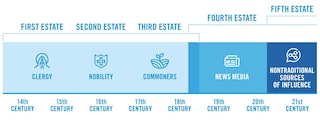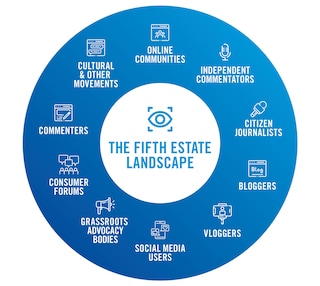The rise of the fifth estate
The use of the term estate to describe realms of influence dates back to feudal Europe.
In prerevolutionary France, the Estates-General was a representative assembly made up of the clergy (First Estate), nobility (Second Estate), and commoners and the bourgeoisie (Third Estate). Different countries created systems to give those three estates a say in running the country, though power largely accrued to the first two.
Then came the Fourth Estate: the news media. In the 18th century, members of the British Parliament noticed outsiders following the proceedings and taking notes. As one commented: “The gallery in which the reporters sit has become a fourth estate of the realm.” Those reporters were pioneers of the Fourth Estate.
Little could those 18th-century journalists with their quill pens have imagined the channels of communication and influence that would develop and give the Fourth Estate make-or-break power. In the ensuing two centuries, mass-circulation newspapers and magazines, then cinema, radio, and television dominated the dissemination of information. Neither could their 20th-century counterparts have been prepared to be scornfully dismissed as “traditional” or mainstream media (read: antiquated) and to find themselves increasingly displaced by yet another massive power, which has come to be known as the Fifth Estate.
While the advent of the internet and social media is credited for the rise of the Fifth Estate, there is another—perhaps more crucial—factor that led to this disruptive shift. The declining trust in mainstream media, in public institutions, and their representatives has made people rethink where and how they consume news and which information sources they can trust.
Much like the platforms that have spurred its growth, the Fifth Estate has the potential to be a positive or negative force. It can spearhead a return to the original promise of social media and the internet—“bringing people closer together” and “making the world’s information universally accessible and useful”—or it can morph into a space where algorithms prevail, favoring echo chambers, clickbait content, and divisive debates. Its impact can go in a million directions, but one thing is clear: The people who make up the Fifth Estate have the power to determine its fate.
Birthed by the exponential growth of digital media, the internet, and social networks, the Fifth Estate is a shape-shifting, 21st-century newcomer and a source of burgeoning sociopolitical power and influence.
Some people think the Fifth Estate is just another way of referring to social media. They’re mistaken. Social media is but one of the digital tools members of this realm use to coalesce, grow, and wield influence.
So, if professional journalists and news organizations make up the Fourth Estate, who can claim membership in the fifth? To answer that question, it is helpful to compare the two.
Members of the Fourth Estate typically work in hierarchical organizational structures and run their output through editorial processes. They deliver content through traditional broadcast and print media. Their operations are costly, and they are funded through advertising and/or subscriptions. Some are owned by corporations such as Bertelsmann, News Corp, Hearst, and Lagardère.
Others, such as Britain’s BBC, Qatar’s Al Jazeera, and France Médias Monde, are owned or funded by the state. Decades of consolidation have resulted in most of the Fourth Estate being owned by conglomerates or big organizations.
In contrast, the Fifth Estate exists in a dynamic and continually evolving landscape of nontraditional nodes of power. It encompasses an enormous and diverse range of individual contributors and groups, incorporating everyone from independent commentators, citizen journalists, bloggers, and vloggers to the many hundreds of millions who use social media platforms and post in the comment sections of mass media. Online communities and groups, grassroots advocacy bodies, consumer forums, and cultural and other movements that come to life through digital platforms are also part of the Fifth Estate.
Members of this realm are characterized far more by their mindset and behavior than by professional status or social background. First and foremost, they are actively engaged in online platforms and create their own content, typically on social media or in blogs, podcasts, or other digital platforms. Like members of the Fourth Estate, they have a digital footprint; a key difference is that they own and control their footprints. Unlike professional journalists and news organizations, Fifth Estate members are independent and freewheeling. They operate outside traditional media institutions and publish whatever and whenever they want directly to their audiences on self-publishing platforms. The platforms of the Fifth Estate are public and typically free to access, although these content providers are increasingly looking to get funding from subscription models rather than advertising. Few are regulated by industry or professional bodies. To the extent that they are regulated, it is by the policies of the platforms through which they publish, by peer pressure, and by the laws of the jurisdictions where they operate.
Though there are exceptions, members of the Fourth Estate typically abide by a well-defined set of values and principles such as accuracy, objectivity, and impartiality. They think in terms of audiences, and their communications are transmitted from content creators to content consumers, with occasional audience participation and feedback. Depending on the ownership model, the Fourth Estate is accountable to shareholders or governors.
In contrast, the Fifth Estate is driven by peer-to-peer dynamics in interactive communication with communities of people who share common interests. Few Fifth Estate participants are accountable to shareholders or a governing body because few are established organizations. They are not bound by a code of conduct (other than the policies of the platforms on which they communicate), are not required to fact-check, and can freely amplify their opinions on any given topic.



